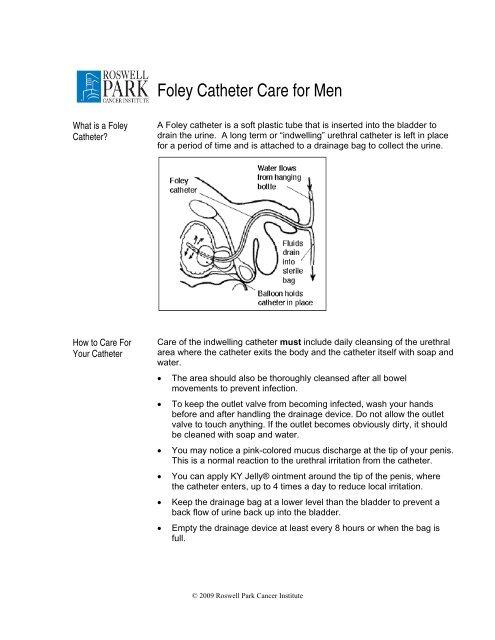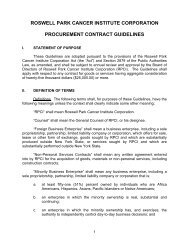Foley Catheter Care for Men - Roswell Park Cancer Institute
Foley Catheter Care for Men - Roswell Park Cancer Institute
Foley Catheter Care for Men - Roswell Park Cancer Institute
Create successful ePaper yourself
Turn your PDF publications into a flip-book with our unique Google optimized e-Paper software.
<strong>Foley</strong> <strong>Catheter</strong> <strong>Care</strong> <strong>for</strong> <strong>Men</strong>What is a <strong>Foley</strong><strong>Catheter</strong>?A <strong>Foley</strong> catheter is a soft plastic tube that is inserted into the bladder todrain the urine. A long term or “indwelling” urethral catheter is left in place<strong>for</strong> a period of time and is attached to a drainage bag to collect the urine.How to <strong>Care</strong> ForYour <strong>Catheter</strong><strong>Care</strong> of the indwelling catheter must include daily cleansing of the urethralarea where the catheter exits the body and the catheter itself with soap andwater.The area should also be thoroughly cleansed after all bowelmovements to prevent infection.To keep the outlet valve from becoming infected, wash your handsbe<strong>for</strong>e and after handling the drainage device. Do not allow the outletvalve to touch anything. If the outlet becomes obviously dirty, it shouldbe cleaned with soap and water.You may notice a pink-colored mucus discharge at the tip of your penis.This is a normal reaction to the urethral irritation from the catheter.You can apply KY Jelly® ointment around the tip of the penis, wherethe catheter enters, up to 4 times a day to reduce local irritation.Keep the drainage bag at a lower level than the bladder to prevent aback flow of urine back up into the bladder.Empty the drainage device at least every 8 hours or when the bag isfull.© 2009 <strong>Roswell</strong> <strong>Park</strong> <strong>Cancer</strong> <strong>Institute</strong>
How to Clean theDrainage BagRemove the drainage bag from the catheter. Attach the catheter to asecond drainage device during the cleansing.Rinse the bag with warm soapy water if necessary.Hang the bag with the outlet valve open to drain and dry the bag.Dealing withCommon<strong>Catheter</strong>ProblemsLeaking: If you have urine leaking from the catheter where it enters thepenis, use diapers or some other absorbent materials to contain theleakage. If the catheter is not draining well, lie down flat and drink a lot ofwater. If you go to your local emergency room, do not let them remove orchange the catheter without first speaking with your doctor.Bladder Spasms: While the catheter is in the bladder, you may experiencebladder spasms, often set off by bowel movements. Signs of bladderspasms include pain in the tip of your penis, urinary or bloody dischargearound the insertion site of the catheter, and pain in your lowerabdominal/pelvic area. To minimize spasm, avoid constipation (use stoolsofteners) and reduce sudden movement that may pull on the catheter. Ifspasms become too painful, we will prescribe medication to decreasethem.Swelling or Bruising: Sometimes, your scrotum and penile area mayswell or look bruised <strong>for</strong> one to two days if you have had surgery. This isnormal and should go away after the catheter is removed. To help reducethe swelling, put a rolled-up towel underneath your scrotum whenever youare sitting or lying down.Blood Clots in your Urine: Small blood clots are normal and will go awayon their own. Large clots, however, can block your catheter and causeurine to leak or your bladder to spasm. If you see any blood in your urine,drink more fluids until your urine clears up. Call us immediately if yoururine stops draining completely.When To Call theDoctorCall your doctor immediately if you experience: any sign of infection: fever of 100.5F (38C) or higher, chills, cough,sore throat, pain or burning upon urination; redness or tenderness alonga vein, at an IV site, or at any other wound or skin irritation bleeding in or around the catheter no urine draining from the catheter, even though you have been drinkingplenty of fluids a lot of urine leaking around the catheter urine that has a very strong smell urine that is thick or cloudy Swelling where the catheter enters your body (your urethra)© 2009 <strong>Roswell</strong> <strong>Park</strong> <strong>Cancer</strong> <strong>Institute</strong>
















